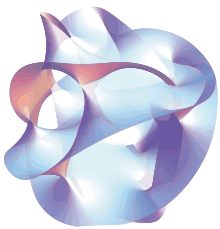Physicist loses bet with science writer: No Nobel for string theory by 2020
 Calabi-Yao manifold
Calabi-Yao manifoldWhat’s interesting is why Horgan won and Kaku lost—and what Horgan expects to happen:
Below are the arguments that Kaku and I presented in 2002. In my argument I predicted that “over the next twenty years, fewer smart young physicists will be attracted to an endeavor that has vanishingly little hope of an empirical payoff.” I’m not sure we’ve reached that point yet. But I hold by my prediction that someday we will look back at the search for a unified theory as a “religious” rather than scientific quest, which never had any hope of being fulfilled…
[2002:] The dream of a unified theory, which some evangelists call a “theory of everything,” will never be entirely abandoned. But I predict that over the next twenty years, fewer smart young physicists will be attracted to an endeavor that has vanishingly little hope of an empirical payoff. Most physicists will come to accept that nature might not share our passion for unity. Physicists have already produced theories-Newtonian mechanics, quantum mechanics, general relativity, nonlinear dynamics–that work extraordinarily well in certain domains, and there is no reason why there should be a single theory that accounts for all the forces of nature. The quest for a unified theory will come to be seen not as a branch of science, which tells us about the real world, but as a kind of mathematical theology. By the way, I would be delighted to lose this bet.
John Horgan, “String Theory Does Not Win a Nobel, and I Win a Bet” at Scientific American
Aw come on! Delighted to lose the bet? That’s icing the cake way too thick, Horgan! 
Michael J. Behe's Blog
- Michael J. Behe's profile
- 219 followers



